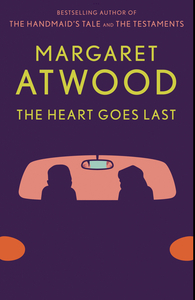You need to sign in or sign up before continuing.
Take a photo of a barcode or cover
Horribly implausible premise (shared jail time? weak economic justification) makes it hard to take this book seriously. It has so much potential exploring some speculative fiction but many of the threads are just preposterous. I was disappointed, expecting better from Atwood.
It was easy to read, but there were several implausible character interactions which just made me glad to be done with it. Shame, because the themes themselves are so rich in potential.
It was easy to read, but there were several implausible character interactions which just made me glad to be done with it. Shame, because the themes themselves are so rich in potential.
dark
fast-paced
Plot or Character Driven:
Plot
Strong character development:
No
Loveable characters:
No
Diverse cast of characters:
No
Flaws of characters a main focus:
No
Graphic: Rape, Violence
dark
mysterious
sad
medium-paced
Plot or Character Driven:
Plot
Strong character development:
No
Loveable characters:
No
Diverse cast of characters:
No
Flaws of characters a main focus:
No
J'ai pas mal aimé ça. J'ai été surprise pendant la lecture parce que ça commence dans une espèce d'hyperviolence et je m'attendais à une oeuvre vraiment sombre et glauque. Finalement, même si on peut dire que le propos l'était, vers la fin les péripéties deviennent vraiment absurdes (j'oserais dire Pynchonesque) et le ton devient beaucoup plus rigolo. Petit bémol sur le dernier chapitre, dont le dernier rebondissement était quand même prévisible, et ça c'est correct, mais où le "dilemme philosophique" était tellement grossièrement étalé que je trouvais ça insultant.
reflective
medium-paced
DNF @ 25%
Atwood's brillance lies in her ability to capture a not-too-distant-dystopia future that is terrifying in it's realism and feels all too familiar. Her books also have several themes (remember when we had to identify those in High School?) which I find is 'missing' from most novels. (Modern novels, imho, are largely "entertainment" and not so "literary").
I know I would have enjoyed this book more if the storyline wasn't so familiar to me. It reminds me too much of [b:The Giver|3636|The Giver (The Giver, #1)|Lois Lowry|https://images.gr-assets.com/books/1342493368s/3636.jpg|2543234] and that terrible Matt Damon movie, Downsizing. There's also an echo of several dystipian YA books, though this is more 'adult' in that it is about two adults and not two teens who are taking down big gov.
If you like the show Black Mirror, you'll love Atwood's work.
Bottom line: Reading Atwood's work in our current climate can be jarring---you almost want to put her books the Stephen King 'horror' category until you're faced with what that would mean about the society in which we now live...
Atwood's brillance lies in her ability to capture a not-too-distant-dystopia future that is terrifying in it's realism and feels all too familiar. Her books also have several themes (remember when we had to identify those in High School?) which I find is 'missing' from most novels. (Modern novels, imho, are largely "entertainment" and not so "literary").
I know I would have enjoyed this book more if the storyline wasn't so familiar to me. It reminds me too much of [b:The Giver|3636|The Giver (The Giver, #1)|Lois Lowry|https://images.gr-assets.com/books/1342493368s/3636.jpg|2543234] and that terrible Matt Damon movie, Downsizing. There's also an echo of several dystipian YA books, though this is more 'adult' in that it is about two adults and not two teens who are taking down big gov.
If you like the show Black Mirror, you'll love Atwood's work.
Bottom line: Reading Atwood's work in our current climate can be jarring---you almost want to put her books the Stephen King 'horror' category until you're faced with what that would mean about the society in which we now live...
3.5 stars
audio
This one was interesting... a lot to make you uncomfortable but for a reason. from the beginning you can tell it's going to end poorly
I think that's what I like most about Atwood... She's definitely not afraid of a "bad" ending.
audio
This one was interesting... a lot to make you uncomfortable but for a reason. from the beginning you can tell it's going to end poorly
I think that's what I like most about Atwood... She's definitely not afraid of a "bad" ending.
I was surprised at how little I enjoyed this book. The original concept I thought was interesting, but it felt like Atwood threw in everything but the kitchen sink to make the book come full circle. How convenient that the prison city just so happened to have created neurotechnology that made a person imprint on the first object they saw after waking up! And what was with the little knitted bears?
Felt like a good concept that got lost and went off the rails.
Felt like a good concept that got lost and went off the rails.
Margaret Atwood’s The Heart Goes Last is a strange beast, but not one that I can recommend.
Conceptually, the book is terrific – Atwood presents us with an economically wreaked near-future America and the married couple of Charmaine and Stan. They live in their car, after deserting the home they could no longer afford, while she works at a bar making enough money to keep their vehicle in gas. When the opportunity arrives to apply to the Positron Project, she leaps at it, and soon enough she and Stan are enrolled. Those admitted into the program alternate months between the town of Consilience and the Poistron project, living as inmates. While they’re in prison, an alternate couple lives in their home, the two flip-flopping in and out of the residence in accordance with the project’s guidelines.
There’s an edgy darkness to the story that I liked, particularly as the couple grow more deeply aware of the corporate surveillance state they find themselves living in. After Charmaine is caught having an affair with another Consilience citizen, both she and her husband are wrapped up in a spider’s web of secrets that soon boils over into conspiracy and manipulation.
However, I never really bought into the very abrupt affair between Charmaine and her alternate Max, which begins with nary a prompt. After Stan discovers a note left for Max, sticking out from under the refrigerator, signed by “Jasmine” and sealed with a kiss, he begins to unravel, intent on winning Jasmine’s love, thinking that Jasmine is Max’s wife. He goes into full-blown psycho-stalker mode, which leads me to my next problem.
Neither of the leads are the least bit sympathetic, and they are only marginally interesting in their contradictions. It’s not long before you realize just how broken and artificial their marriage is. Much like the Poistron Project itself, both have a certain superficial veneer, but each is rotten to the core. Stan is a sex obsessed creep with anger management issues and a number of rapey impulses who wants to bang anything with a pulse, including the chickens he oversees during his time in prison, and the sexbots introduced in the book’s last third, programmed to give the appearance of a pulse.
Most of the novel’s first-half feels a bit soggy from the rinse-and-repeat narrative in which Stan lusts for sex with Charmaine, Charmaine has sex with Max, Stan lusts for sex with Jasmine and plots ways to track her down before they alternate their lives between the city and prison. This first half, though, feels long and plodding and I spent most of the book wishing I could move onto some other title rather than continuing to engage in a progressively growing number of pointlessly mundane exercises that make up these chapters. It’s not until the last half of the book, or perhaps even later, when things finally pick up and take on the bent of a paranoid conspiracy thriller. Unfortunately, this devolves into sheer absurdity with a finale involving a handful of Elvis and Marilyn Monroe impersonators.
Ultimately, I feel largely ambivalent about The Heart Goes Last, falling somewhere between “didn’t like it” and “meh.” I’d recommend skipping this one.
[This review is based on an advanced copy received from the publisher via NetGalley.]
Conceptually, the book is terrific – Atwood presents us with an economically wreaked near-future America and the married couple of Charmaine and Stan. They live in their car, after deserting the home they could no longer afford, while she works at a bar making enough money to keep their vehicle in gas. When the opportunity arrives to apply to the Positron Project, she leaps at it, and soon enough she and Stan are enrolled. Those admitted into the program alternate months between the town of Consilience and the Poistron project, living as inmates. While they’re in prison, an alternate couple lives in their home, the two flip-flopping in and out of the residence in accordance with the project’s guidelines.
There’s an edgy darkness to the story that I liked, particularly as the couple grow more deeply aware of the corporate surveillance state they find themselves living in. After Charmaine is caught having an affair with another Consilience citizen, both she and her husband are wrapped up in a spider’s web of secrets that soon boils over into conspiracy and manipulation.
However, I never really bought into the very abrupt affair between Charmaine and her alternate Max, which begins with nary a prompt. After Stan discovers a note left for Max, sticking out from under the refrigerator, signed by “Jasmine” and sealed with a kiss, he begins to unravel, intent on winning Jasmine’s love, thinking that Jasmine is Max’s wife. He goes into full-blown psycho-stalker mode, which leads me to my next problem.
Neither of the leads are the least bit sympathetic, and they are only marginally interesting in their contradictions. It’s not long before you realize just how broken and artificial their marriage is. Much like the Poistron Project itself, both have a certain superficial veneer, but each is rotten to the core. Stan is a sex obsessed creep with anger management issues and a number of rapey impulses who wants to bang anything with a pulse, including the chickens he oversees during his time in prison, and the sexbots introduced in the book’s last third, programmed to give the appearance of a pulse.
Most of the novel’s first-half feels a bit soggy from the rinse-and-repeat narrative in which Stan lusts for sex with Charmaine, Charmaine has sex with Max, Stan lusts for sex with Jasmine and plots ways to track her down before they alternate their lives between the city and prison. This first half, though, feels long and plodding and I spent most of the book wishing I could move onto some other title rather than continuing to engage in a progressively growing number of pointlessly mundane exercises that make up these chapters. It’s not until the last half of the book, or perhaps even later, when things finally pick up and take on the bent of a paranoid conspiracy thriller. Unfortunately, this devolves into sheer absurdity with a finale involving a handful of Elvis and Marilyn Monroe impersonators.
Ultimately, I feel largely ambivalent about The Heart Goes Last, falling somewhere between “didn’t like it” and “meh.” I’d recommend skipping this one.
[This review is based on an advanced copy received from the publisher via NetGalley.]


